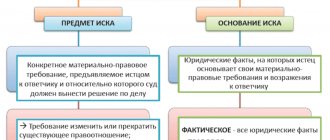Modern people are accustomed to saving their time by delegating any tasks to competent persons. That is why even such a simple procedure as deregistration at a specific address should take place with minimal participation of the deregistering citizen. Very often, citizens of our country prefer to check out of their apartment through the MFC - “My Documents” paper collection points. The popularity of these government services is due to the accelerated procedure and the absence of the need for a citizen to independently visit many different departments to obtain the necessary papers. In this material we will talk about exactly how the procedure for deregistration from an apartment takes place with the participation of the MFC.
Check out of the apartment through the MFC
Is it possible to check out of an apartment in the MFC?
Initially, “My Documents” was created due to the excessive load created on the departments of the Ministry of Internal Affairs of our country. Subsequently, thanks to the effective work of the created organizations, the responsibilities performed began to include other functions. In particular, today there are representatives of the Federal Migration Services working there, who are responsible for the discharge and registration of citizens at various addresses.
According to the letter of the law, a citizen of our country has the right to independently determine the place of discharge from the current address of residence:
- directly the migration authority;
- an intermediary who is represented by the MFC.
It turns out that checking out of an apartment using the MFC is not only possible, but also necessary in order to make this task easier for yourself and save time. The persons registering your extract do not have the right to refuse you to carry out this procedure if you decide to use the services of an intermediary.
When documents can be rejected
In addition to the situation described above, citizens may receive a refusal from an MFC employee to accept documents in the following cases:
- the content of the application cannot be read or the document was submitted by an unauthorized person;
- documents that are required to be submitted were not provided to the MFC;
- movement within the territory of Russia was limited by Russian legislation (for example, “martial law” was introduced).
At the same time, the law does not provide for refusal to provide the service in question or its suspension for any period. Also, every citizen has the legal right to file a complaint against an action/inaction or against the final decision of the registration authorities in the event of:
- refusal to correct various types of typos and errors that were made when preparing documents by employees of the multifunctional center;
- violation of the deadlines for the provision of public services or the deadlines for registering an application;
- requirements for documents that are not listed in the list approved in the Administrative Regulations;
- demands from the applicant for a fee that is not established by current legislation;
- refusal to accept documents that must be accepted in accordance with the terms of regulations.
Is it possible to check out of an apartment through the MFC remotely?
So, an extract through the MFC in any case implies a personal visit, however, the following can come to the organization:
- the person changing his place of residence;
- a citizen who is the official representative of the person being deregistered.
In other words, if you urgently need to check out, but you are abroad, send the person for whom you have drawn up a notarized power of attorney to decide your affairs.
Remote statement through a multifunctional center is possible, provided that your interests are represented by a notarized representative of a person
It turns out that if you suspect that you will be leaving and that you will not be able to resolve the issue of discharge on your own, you must first do the following:
- choose a trusted person from among your circle and draw up a so-called power of attorney for him with a notary, general, or narrowly focused, giving this person the opportunity only to represent you at the MFC;
- prepare all the documents necessary for transfer to the organization, also having them notarized.
Provided that you do everything correctly, a person you have identified who is especially trustworthy will go to “My Documents” and will be able to carry out the entire procedure for you, providing the center employees with:
- the papers you collected;
- a copy of your passport;
- power of attorney to confirm authority.
Provided that at least one of the above documents is not provided, the official representative will be denied the procedure.
Please note: in recent years, cases of real estate fraud have seriously increased, in which fake powers of attorney are often used. That is why, when deregistering from an apartment, carried out with the participation of a trusted person, delays may arise, since the department does not have the right to refuse, but can temporarily slow down the process. Simultaneous carrying out by a trusted person will help you avoid disruption of plans:
- not only checking you out of the apartment;
- but also registration in a new place.
Thus, in the eyes of the state you will be protected.
Sample of a notarized power of attorney
Arbitrage practice
Judicial practice is quite clear - if there are sufficient grounds for discharge, then the decision will be in favor of the plaintiff. The most common cases when former relatives are required to be discharged are:
Example. After the death of Gordeev V.P. the apartment was inherited in equal shares by his adult daughter Gordeeva N.V. and son Gordeev V.V. Since the apartment was municipal, the children were registered in it and included in the social tenancy agreement, re-issuance of this document was not required. However, a year later, the daughter initiated a genetic examination, which showed that Gordeev V.V. is not the biological son of the deceased. On this basis, she filed a lawsuit to recognize her ex-brother as illegally residing in the apartment and her demands were satisfied.
An equally common situation is when a person who has not lived there for a long time needs to be discharged from an apartment. After all, often the plaintiff does not even know the place where the defendant is located.
Example. Ivanova D.V. For a long time she cohabited with I.G. Gavrilov, but they did not enter into an official marriage. Gavrilov owned an apartment in another city, but in order to get a job, he needed registration in the apartment of D.V. Ivanova, which she allowed to do. After 10 years of living together, Gavrilov began to abuse alcohol and Ivanova kicked him out of the apartment. He left for his hometown and never returned. Ivanova had to file a claim in court to remove Gavrilov from registration. The defendant did not appear in court, the decision in favor of the applicant was made by the court in absentia.
What documents do you need to collect to check out of the apartment?
The list of documents required for deregistration from an apartment will be the same regardless of through which department you are deregistered. A package of documents must be prepared in advance, even before you go to the MFC, making sure that it contains all the papers you need.
It is not possible to check out of the apartment without providing a passport.
So let's talk about what you need to collect.
1. First of all, an identity card of the citizen wishing to be discharged is provided. Provided that you are an adult, only your passport can be accepted as such a document. If the extract is carried out for a child under 14 years of age, then you must provide:
- passport of his parent, guardian or other legal representative;
- birth certificate.
2. Application for discharge from the apartment (form No. 6, only one of its counterfoils is filled out).
3. If a child who is the owner of its share is discharged from the apartment, then it will also be necessary to provide permission from the guardianship authorities, as well as a notarized undertaking that in the new housing the child will again be provided with a share of similar value.
If you are simultaneously planning to register at a different address, you will need to provide a slightly modified package of documents.
4. Citizen's identity card.
5. Completed application form No. 6 (this time the data is entered in both counterfoils).
6. If you rent housing and want to register there, you must also provide consent from the owner of the property you are looking for.
7. A copy of the main document of the citizen who owns the living space in which you are registering.
8. Official papers issued for this house.
How to fill out an application on form No. 6 for discharge from an apartment
As you may already understand, application form No. 6 has two separate sheets:
- application for deregistration at a specific address;
- application for registration at a specific address.
The form must be filled out by the citizen who is going to be discharged and registered. Let's consider the content of its part dedicated to checking out of the apartment.
1. First of all, you need to indicate the full name of the migration service agency to which you are submitting your application (you are assigned to it at your place of residence).
2. The following indicates who the application is coming from, that is, your personal data containing information about:
- FULL NAME;
- date of birth.
3. Then you need to indicate that you have a passport and give its details:
- series;
- number;
- department code;
- date of issue.
4. Provided that if a child is being discharged whose age is less than 14 years, the full name of the legal representatives must be indicated.
5. Next, indicate the address of the property where you have a residence permit, and from where you actually want to check out.
6. The following are added as a finishing touch:
- The current date;
- applicant's signature;
- transcript of the applicant's signature.
Sample of filling out an application for deregistration at the place of residence
Provided that you are leaving the place of temporary registration, you will also need to fill out an application, but not that, just write it in free form. However, you will need to indicate almost all the same data:
- name of the FMS body;
- Full name of the applicant;
- information about the property in which you lived;
- request for deregistration.
You will need to provide the completed application immediately, along with all the other documents that you have prepared for submission to the Multifunctional Center for review and processing.
Timing and cost
The rules approved by Government Decree No. 713 dated July 17, 1995 give the registration authority 8 working days to complete actions to extract and register the applicant. The countdown starts from the date of submission of the application and necessary documents.
The official of the registration authority is obliged to send an application to the authority at the citizen’s previous place of residence within three days from the date of registration. So he will be removed from the register. The date of the statement must correspond to the date of registration at the new address.
Registration services are provided to the population free of charge. If notarial consent is required, it is paid in accordance with the current notarial fees.
FacebookVKontakte
Instructions - how to check out of an apartment through the MFC
To better understand what to do when you decide to part with your current place of residence by contacting the MFC, we advise you to read these instructions, which describe the step-by-step procedure aimed at completing the task assigned to you: to check out as soon as possible in legally.
Please note: you initially need to be prepared for the fact that “short time” in this case is a relative concept, since, although they free you from the need to independently contact various departments, they are still intermediaries, which is why the possible time frame for solving the problem is still somewhat will increase.
Step No. 1 – pre-registration
Regardless of who will visit the center (you or your authorized representative), the instructions will be the same in each case. And the first step in it will be a personal appearance at the MFC.
To complete the task as quickly as possible, you must first make an appointment with the department. To do this you need to visit the website.
Those areas of the page where you need to focus your attention are highlighted in red.
So, first of all, you need to find the inscription “Preliminary registration” on the left side of the page. Under the required inscription there will be a list of addresses, at each of which one of the Multifunctional Centers is located. Choose the address that is most convenient for you and click on it.
After clicking on a specific address, a table will appear in the middle of the screen with the names of the departments whose services you would like to receive. Choose the option that suits you.
Next, under the table you will need to select what kind of person you are:
- physical;
- legal.
Since you want to change your registration, you need to check the box next to the individual. Then click on the “select” button.
What the record selection window looks like
In the next window that opens, a table appears with which you can choose:
- day of visiting the department;
- time of visit to the department.
Free time is highlighted in red, busy time is highlighted in blue.
Choose the option that suits you and click on it directly in the table.
The registration is completed by entering personal data
After selecting the date and time that suits you, you will be redirected to a page to enter your personal information, such as:
- SNILS;
- FULL NAME;
- contact number;
In addition, you will need to indicate the quantity:
- objects of circulation;
- participants of the appeal.
After filling out this form, click on the button to make an appointment and complete the pre-registration procedure.
Please note: you can get to an MFC specialist to resolve your issue on a first-come, first-served basis. To do this you just need:
- appear at ;
- take the corresponding coupon from the electronic machine;
- wait your turn.
However, despite the simplicity of this process, your turn may not come soon, especially if you do not come to the organization early in the morning. In some cases, it is even postponed to the next few days.
Step No. 2 – visit the Multifunctional Center and transfer of documents
So, whether you pre-registered, or waited in the live queue for some time, you will sooner or later get an appointment with a specialist. The first conversation with a center specialist lasts, as a rule, no more than 15 minutes, during which the following processes occur:
- The center’s specialists check your application and accept it officially;
- The presence of all necessary documents and the compliance of each paper with the requirements for it are checked.
The first room of the multifunctional center will take you no more than 15-20 minutes, of course, if you don’t have to wait your turn
If you haven't completed the application at home, don't worry. They can give you a blank form right on the spot, and at the same time they will give you some advice. How to fill out certain lines that remain unclear to you.
If the center’s specialists are satisfied with everything, they will take from you not only all the documents on the list, but also your passport, which will be needed to affix the discharge stamp. During the procedure, you will be issued a temporary identity card.
After handing over the documents, you can go about your business.
Step No. 3 - wait for a call from the Migration Office
After some time, an employee of the department of the Migration Office to which you belong (or rather have already belonged) according to your place of residence will contact you and make an appointment.
When you come to the Department of Internal Affairs of the Ministry of Internal Affairs, you will receive:
- passport with a stamp affixed to it;
- departure slip.
A departure slip is a temporary document indicating that you have left your previous place of registration. Congratulations, you have officially completed the discharge process!
At the end of the procedure, you will receive a passport, which will indicate that you have been successfully discharged from your previous place of residence
Please note: if you did not check out yourself, but resorted to the help of an official representative, the steps of the instructions presented above will still remain the same for you. However, two more necessary procedures will be added to them:
- visiting a notary to draw up a power of attorney;
- notarization of all documents listed earlier in the article.
Only after you have completed all matters with the notary, will your friend be able to go to the MFC to issue an extract.
Who can be discharged by court order and who cannot?
When going to court, the applicant needs to be prepared for the fact that the claim will not be satisfied, because in some cases it is impossible to evict citizens from an apartment.
Categories of citizens whose discharge will not cause problems:
- former spouses who are not the owners of the apartment;
- persons serving sentences in places of deprivation of liberty;
- citizens who serve in the army;
- people actually living elsewhere;
- rowdies, hooligans or alcoholics;
- parents of a minor child who have lost their right to live with him;
- persons who are not relatives of the owner (you will find out whether the owner himself will be able to write out relatives if there is such a desire).
But citizens who belong to these groups are unlikely to be evicted from their apartment even if they go to court :
- apartment owner;
- minor child;
- a citizen who was registered in the apartment before its privatization and during this procedure renounced his rights to housing;
- persons who do not have other housing and the funds to buy or rent it (read whether it is possible to discharge a person “to nowhere” here).
In the latter case, the court may grant the tenant a delay in eviction for a period of one year - after which the owner will have to apply to the court again.
Pros and cons of carrying out the deregistration procedure using the MFC
Let's talk about the pros and cons of deregistration with the MFC that we have identified after reading this material.
Table 1. Pros and cons of completing the procedure for deregistration from an apartment by contacting
| Advantages | Flaws |
|
|
As you can see, there are clearly more advantages than disadvantages. This must be taken into account when deciding whether you will deal with the discharge yourself, or entrust your affairs to professional specialists.
Reasons for discharging a person
In order to forcibly, by court, discharge a person without his consent, there must be compelling reasons. It is noteworthy that the owner of the apartment must prove the existence of such grounds directly. Such reasons include:
Divorced marriage
After its dissolution, the ex-husband and wife are no longer considered relatives. As a result, the husband or wife who does not own the apartment is required to check out.
If the housing was purchased during marriage or serious money from the family budget was spent on bringing it to its current state, then both spouses will apply for the apartment. From a legal point of view, such housing belongs to them equally (for example, 50 to 50). In this case, it does not matter to whom exactly the property was registered. Thus, both spouses are co-owners of the apartment. And since it is impossible to evict a co-owner, even going to court will not help. To solve the problem, it is recommended to divide the property (for example, also in court or voluntarily) and only after that, having decided who has what and how much remains after the divorce, deal with the extract.
Failure to fulfill obligations to pay utility bills
In this case, it is assumed that the person actually lives in the apartment, uses water, gas, electricity, sewerage, and so on, but does not pay for them. In some cases, this is acceptable if there is a certain agreement with the owner (for example, in addition to paying for utilities, the tenant ensures that there is food in the refrigerator at his own expense), but more often than not, each of the registered people is required to pay their share of the services. If this does not happen, then such a tenant can be forcibly discharged. It is also necessary to take into account the fact that non-payment for services must be long-term. At least 3-6 months (depending on the situation). If a person has not paid for just 1 month, this is not yet a reason to go to court. Such a claim will most likely not be satisfied.
If there are other agreements between the tenant and the owner of the apartment regarding the payment of utility services, they must be documented. Oral agreements will not be considered evidence for the court. As a result, a tenant can regularly fulfill his obligations for the same purchase of products, but not pay rent, and the owner will force him out precisely because of failure to pay utility bills.
Public order disturbance
Some residents behave frankly disgracefully. They make noise at night, play very loud music, regularly have drinking parties, fights, and so on. If this happens quite rarely (for example, once a month), it is still tolerable. Everyone has “fasting days” or some kind of problems. But if such a violation of order occurs regularly, then the only way to evict such tenants and discharge them is to go to court.
In this case, in addition to the evidence collected by the owner, testimony from neighbors is also needed.
The person does not live at the registration address
If a person is registered at one address, but lives differently (the reasons are not important), then he can be discharged only on this basis. Of course, the period of absence from the place of registration must be impressive (at least six months). In addition, you need to make sure that the person does not live at the registration address for compelling reasons.
Example: A student is registered in one city, at one address, but is sent to another locality for study. He is moved into a dormitory and given temporary registration for the entire period of his studies. This is a good reason. In fact, a person is forced to not live at his main registration address because he could not find a suitable university in his hometown. He does not pay for utilities, but does not consume them either. As a result, he cannot be evicted for such a “violation”.
Selling an apartment
If the housing was purchased by a new owner, then the persons registered in the apartment are not his relatives, they did not enter into any agreements with him and, as a result, do not have any right to live in this apartment. Under such conditions, the new owner can go to court only if there is a purchase and sale agreement.
Most often, buyers demand that all residents be removed from the apartment before the transaction is completed, so as not to waste time going to court in the future. However, this is not always possible for various reasons. Old residents may receive a certain delay (for example, 1 month) in order to check out voluntarily (this fact is also reflected in the purchase and sale agreement). During this time, they must find another place to live and register there. If this condition is not met, the new owner can also forcefully remove all old tenants through the court on the basis of the same purchase and sale agreement.
The apartment is not used for its intended purpose
Some residents turn the apartment they live in into a warehouse, a confectionery shop, and so on. This is not the intended purpose of housing and, as a result, they can be discharged only on the basis of such a factor. The main problem here is the lack of evidence. Long-term photography and video recording will be required, as well as testimony from neighboring witnesses in order to prove the fact of misuse of the property. Otherwise, the court will reject the claim.
Military service or serving a sentence in prison
Despite the differences in situations, in the case of an extract, everything is almost identical. In both cases, the person is registered, but to a new address (in prison or in a military unit). As a result, he can be safely discharged. These are one of the few situations in which there is no need to go to court; documents confirming the fact of serving a sentence or being sent to service will be sufficient.
After returning from prison or the army, a person has the right to demand that his registration be restored. This needs to be taken into account.
Death of a tenant
Another option that does not require a court decision. It is enough to collect evidence of the resident’s death (death certificate) and, on its basis, submit documents for the discharge of the deceased.
If a person goes missing and is subsequently declared dead, a court decision will be required that confirms this factor. If the allegedly deceased ever returns, he may demand that his previously valid registration be restored.
Deadlines for leaving the apartment
The convenience of working with is obvious, but it should be noted that many citizens still avoid it, knowing that the time it takes to complete the documents they need is thus increased several times.
So, within three days, the papers you submitted must be reviewed when working without intermediaries, however, subject to contact with departments established through the MFC, this period can increase from 6 to 8 days.
The discharge procedure itself may take about 14 days if it occurs in the same locality. If you are leaving from another city, the total period may be about 3 months.
How long does it take to check out?
When applying for an extract from the “My Documents” MFC, you must keep in mind that the time frame for providing the service will be slightly increased in comparison with the time you will spend contacting the Department of Internal Affairs of the Ministry of Internal Affairs of the Russian Federation directly.
Approximate dates:
- If you apply directly to the migration authority, it will take 3 business days to process your request for an extract.
- The same procedure, but carried out through the MFC, will take from 4 to 6 days, and in some cases it can take up to two weeks.
This amount of time is required for the Center’s employees to check the documents and transfer them to the registrar at the same department of the Department of Internal Affairs of the Ministry of Internal Affairs of Russia.
As soon as this happens, you will receive a message on your phone about the appointed date of your visit to the Migration Department of the Ministry of Internal Affairs of the Russian Federation to receive a passport with a registration stamp.
Price of the procedure
Speaking about the cost of applying to the MFC for an extract from an apartment, it should be noted that in this case it is zero. It does not charge any state fees for providing mediation services to citizens.
However, if you decide to carry out the extract with the help of a trusted person, you will have to spend money at the notary. In general, certifying all the necessary papers and issuing a power of attorney will cost you about 2.5 thousand rubles.
Checking out at the MFC is as easy as shelling pears, so if you are in no hurry, contact this organization
Let's sum it up
Anyone who has such a need can check out of an apartment through the MFC. The mentioned organizations were created to ensure that Russian citizens solve various bureaucratic procedures, using the so-called “one-window principle,” which implies resolving all issues and processing documents in contact with only one institution, and sometimes with the same specialist.
This practice has been hastily carried out in our country for several years, attracting more and more new clients. Since the effectiveness of these institutions has been proven by their popularity among ordinary people, we advise you to turn to them for help.
How to deregister this way?
- The citizen prepares the necessary papers and makes copies.
- Finds out where the mediation center branch is located.
- Specifies opening hours and what services are provided.
- You can make an appointment during a personal visit or on the State Services website (can you sign up through the State Services themselves?).
- With an electronic coupon, go to the free registration window.
- Gives the completed application for discharge to the Center employee. Presents documents.
- He leaves his passport with the employee and takes the rest of the papers.
- Accepts a receipt with a list of documents handed over.










